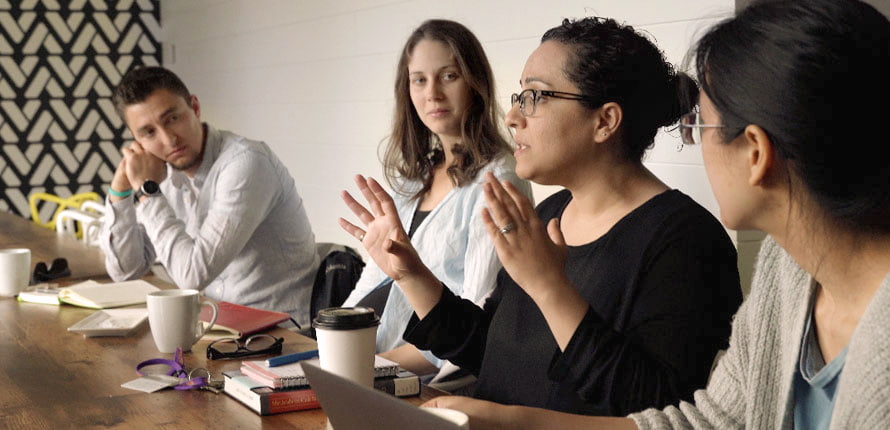Search for academic programs, residence, tours and events and more.
The interdisciplinary Master of Arts (MA) in Cultural Analysis and Social Theory (CAST) is a 12-month program that provides dynamic graduate experience in an intimate intellectual community.
Our unique program brings together students with a wide variety of academic backgrounds to examine contemporary social and cultural issues while expanding and diversifying knowledge sets and developing advanced research and communication skills.

Our program is designed to foster the type of critical inquiry that extends beyond the boundaries of a single academic discipline. Working with professors from across the humanities and social sciences, you gain a comprehensive perspective on the diverse theories and critical methodologies essential to understanding contemporary culture and society and the many challenges we face both locally and globally.
Through coursework and an optional independent research project, you refine your critical thinking, research, and analytical skills, broaden your perspective on contemporary issues and gain new insights into the social and cultural forces that shape the modern world. Our highly personalized program encourages students to place diverse perspectives into vital conversations in order to understand impediments to social justice.
Our program welcomes students from a wide variety of undergraduate disciplines and universities across Canada and around the globe. Our students include both those who have just recently completed their undergraduate studies and those who are professionally situated and wish to further their education. We offer a lively and intellectually engaging program designed to enable you to successfully conduct your graduate studies in a supportive student-centred environment.
You will benefit from taking courses and interacting with scholars working on cutting-edge research in contemporary cultural analysis and social theory from a variety of interdisciplinary perspectives.
The diversity of our collective expertise makes CAST particularly relevant for students who wish to extend disciplinary boundaries, question established ways of thinking, explore the richness of contemporary theory and examine the nuances and complexities social life from a variety of complementary perspectives.
The program is structured around three inter-related fields of inquiry:
You can choose either a Coursework option or a Major Research Project option.
For the Coursework option, you will take:
For the Major Research Project option, you will take:
*Under the supervision of a faculty member, students complete the major research project in which they engage in original research on an approved topic. Projects may take the form of a paper between 50 and 70 pages in length, or an equivalent alternative or creative project approved by the program.
CAST faculty and student research supports the development of critical strategies that underpin thriving communities and our readiness to ethically engage the future.
Key attributes of faculty research include: championing social diversity and inclusion; broadening understandings of ethical agency; centering awareness of social justice; and evaluating and understanding the production and limitations of knowledge, interpretation, and analysis, particularly as we attempt to address increasingly complex questions of our time.
Research Assistantships are periodically available to CAST students. These research assistantships enable you to work closely with a faculty mentor on a specific research project.
Recent research assistantships include constructing a digital memory map of Kitchener-Waterloo, curating an online art exhibition, and helping to organize a major international conference on biopolitics. Specific topics and the availability of research assistantships vary from year to year.
CAST elective courses examine the complex forces involved in the shaping of cultural processes, forms of subjectivity and modes of social inclusion and exclusion. You will explore:
Over the course of your studies, you deepen your appreciation for how political and ethical agency is possible – and why it is vitally important – in our globalized world.
We regularly offer special topics courses in order to address new areas of research expertise and teaching in our program. Please consult our posted list of yearly courses offerings to see topics and course descriptions.
Elective course offerings vary from year to year. We offer three electives in each year drawn from the following options and depending on faculty availability:
"Experiencing CAST and an interdisciplinary framework made all the difference in determining my academic path. No two cohort members shared the same educational backgrounds, so conversations proved fruitful and all the more enlightening. The professors from across schools enriched the overall breadth and program quality."
Makenzie Salmon (MA '21)
Take the first step in your graduate education and apply to one of our graduate programs. Follow our three-step admission process — we’ll walk you through how to apply and prepare for your first day as a graduate student.
The CAST Admissions Committee will begin considering applications starting on Feb. 15 and will continue to accept applications until the program is full.
After you have submitted your OUAC application, paid the non-refundable application fee, and Laurier has received your application, you'll receive an email from gradadmissions@wlu.ca advising you to upload the additional required documentation to Laurier’s Online Registration and Information System (LORIS).
Please note, the application process and the uploading of supplemental documentation, which includes references, typically takes two weeks. To avoid disappointment, apply early.
An application for admission to our MA program in Cultural Analysis and Social Theory must include:
Visit our Graduate Admissions Toolkit for more information about applying.
Proficiency in written and spoken English is essential to graduate studies at Laurier. Applicants whose language of instruction during their previous postsecondary education was not in English must submit evidence of proficiency in English. If applicable, results from accepted testing services must be uploaded to LORIS.
Questions? Contact Alicia Sliwinski, graduate coordinator, at asliwinski@wlu.ca. For general inquiries, email macast@wlu.ca.
"Some highlights for the program for me included: small, intimate classes that allowed for deep conversations that explored specific areas of interest; the ability to integrate Indigenous cultural practices within the coursework; and a supportive group of faculty that encouraged creative inquiry and challenged students in a constructive ways."
Cara Loft (MA '20)
Eligible students receive guaranteed funding for their studies. This funding comes in the form of a teaching assistantship in the amount of $14,000 to $16,000 per year. Graduate Teaching Assistants typically work in such areas as Anthropology, Cultural Studies, Global Studies, Women and Gender Studies, and related fields in the Humanities and Social Sciences.
Additional funding is periodically available to enrolled students in the form of a research assistantship.
Winners of major external awards (OGS and Tri-Council) may be eligible for top-up funding which includes the Dean’s Graduate Scholarship (total value exceeds $10,000). A list of all funding opportunities available to Laurier graduate students is available on our graduate funding webpage.

Graduates of the CAST program have identified the ways that their degree in CAST has helped them professionally, such as advanced skills in research, analysis, communication, critical thinking, and diversity and inclusion, among others. Alumni surveys show our students have high success rates in locating employment related to their studies following graduation and in securing admission to programs to continue their studies, including law school and PhD programs.
Graduates of our CAST program have pursued the following career options:
ASPIRE is Laurier's professional skills development training program for graduate students. The program helps you craft an individualized, extracurricular learning plan tailored to your professional journey and entry to the workplace.
Learn about the interests of our faculty members. If you are looking for more information about this program, have questions, or want to set up a meeting, contact a member of our team.
Ehaab D. Abdou
Assistant Professor, Global Studies
Greg Bird
Associate Professor, Sociology
Alexandra Boutros
Associate Professor, Communication Studies and Cultural Studies
Colleen Kim Daniher
Assistant Professor, Communication Studies
Stacey Hannem
Professor, Criminology
Penelope Ironstone
Associate Professor, Communication Studies and Cultural Studies
Jordan B. Kinder
Assistant Professor, Communication Studies
Sara Matthews
Associate Professor, Communication Studies
Jane Newland
Associate Professor, Languages and Literatures
H. F. Pimlott
Associate Professor, Communication Studies and Cultural Studies
Natasha Pravaz
Associate Professor, Anthropology
Ian Roderick
Associate Professor, Communication Studies and Cultural Studies
Edward Shizha
Professor, Society, Culture and Environment / Youth and Children’s Studies
Fellow, Tshepo Institute for the Study of Contemporary Africa
Alicia Sliwinski
Associate Professor, Global Studies
Program Director
Milo Sweedler
Professor, Languages and Literatures
Kenneth Werbin
Associate Professor, Digital Media and Journalism
Think this is the perfect program to continue your education?